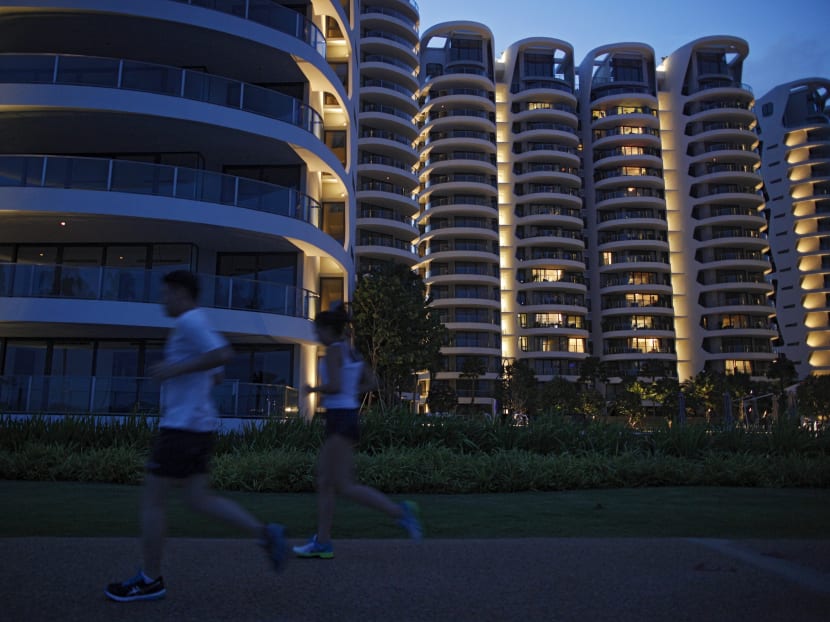Private home prices fell 3.7% last year, analysts see further decline
SINGAPORE — Private home prices fell at a slower pace last year, helped by a steady pool of buyers purchasing both new and resale homes, but analysts warned of headwinds facing the residential market this year amid rising interest rates, a plunging stock market and a wave of new supply.

Joggers pass a largely vacant condominium on Singapore's Sentosa island in this file photo. Photo: Reuters
SINGAPORE — Private home prices fell at a slower pace last year, helped by a steady pool of buyers purchasing both new and resale homes, but analysts warned of headwinds facing the residential market this year amid rising interest rates, a plunging stock market and a wave of new supply.
The private residential property index fell by 3.7 per cent last year to 141.6, final data from the Urban Redevelopment Authority (URA) showed today (Jan 22), compared with the 4 per cent decline in 2014. In the fourth quarter, private home prices fell 0.5 per cent, slowing from the preceding quarter’s 1.3 per cent decline, the URA data showed. Still, it was the ninth straight quarter of price decline, marking the longest losing streak in 17 years. The data matched the URA’s flash estimates reported earlier this month.
In the last quarter, developers sold 1,603 private homes, sharply below the 2,410 units sold in the preceding quarter. There were also 1,464 resale transactions, down from 1,619 units previously.
For the full year, however, developers registered a slight pick-up in sales to 7,440 from 7,316 in 2014, while the resale market saw a 24 per cent jump in volume to 6,160 units from 4,964 previously as prices fell.
“The residential market held up relatively well in 2015, largely due to strong holding power of developers and sellers in a low interest rate environment and steady gross domestic product growth. The overall residential price index has declined for nine consecutive quarters and is 8.4 per cent below the last peak in third quarter of 2013,” said Ms Christine Li, director and head of research at property firm Cushman and Wakefield.
The overall price downtrend will continue this year, analysts said, with mortgage rates in Singapore rising after the US Federal Reserve raised its benchmark rate last month for the first time in a decade.
Meanwhile, the Straits Times Index has fallen 10.6 per cent this year as of today’s close, marking a one-year loss of 20.8 per cent, with oil prices near 12-year lows.
“Since the beginning of 2016, rising interest rates, plunging oil prices and stock market sell-off has set the stage for a perfect storm in the residential market. Coupled with higher vacancy rates, softening rents and another record year of construction completions, developers and sellers with weaker holding power may have to let go of their units at a lower price. In addition, slower population growth of 1.2 per cent in 2015 and lower GDP growth forecast of 1 to 2 per cent in 2016 could trim demand for housing,” Ms Li said.
Meanwhile, the property market curbs are expected to remain in place, said analysts, who pointed to Minister for National Development Lawrence Wong’s recent comments that it was still too early to unwind some of the cooling measures.
“We may expect 2016 to fare slightly worse in terms of pricing, with a 4 per cent to 6 per cent decrease for the whole year,” said Mr Eugene Lim, Key Executive Officer of property agency ERA.
This could be a good time for buyers waiting on the sidelines to come in, especially in the resale market, as homes become more affordable, analysts said.
“This is partly supported by the rising household income and low unemployment rate. In addition, there is still underlying demand for the residential properties. This could come from investors and home owners who have made capital gains on their previous purchases and are now looking to re-invest their capital gains,” Ms Li said.
“There will also be more market activity, particularly in the resale segment this year due to more residential units bought with Seller’s Stamp Duty (SSD) meeting the four-year deadline to be eligible for sale without any penalty,” Ms Li added, noting that the higher SSD was introduced in January 2011.
“This could incentivise those who have broken even or even made some capital gains to offload the units in the market. As such, 2016 will be a good year for bargain hunters as home prices will be more affordable.”






